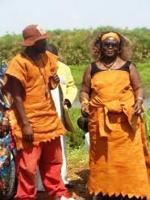Ruaha University College Tanzania
Here are the details to know about Ruaha University College Tanzania , Courses and programmes offered at Ruaha University College, Hostels and accommodation facilities at Ruaha University College, Admission forms and Requirements and all you need to study at this university college in Ruaha Tanzania
Ruaha University College (RUCO) is a constituent college of St. Augustine University of Tanzania (SAUT).
RUCO was established by the Tanzania Episcopal Conference (TEC) under its Trust Deed of the Registered Trustees of Ruaha University College who are the trustees of SAUT, through the generous support of good wishers (friends of RUCO) within and outside the country.
His Lordship, the Right Reverend Tarcisius J.M. Ngalalekumtwa, the Bishop of Iringa, is TEC’s local immediate eye, inspiration and guidance for the development of the college.
The college is governed and administered in accordance with the Catholic Church Policy on Higher Education Institutions - Excorde Ecclesiae and the provisions of the constitution establishing constituent college of St. Augustine University of Tanzania (SAUT).
Nonetheless, RUCO is a private and secular institution of higher learning that is open to all regardless of their faiths or religious affiliations.
It does not discriminate on grounds such as race, ethnicity, gender, disability or caste.
Ruaha University College Location
RUCO is in the Iringa municipality along Uhuru Avenue on the Great North Road to Dodoma, at what used to be Dr. Amon J. Nsekela Bankers’ Academy, in the Wilolesi area.
Ruaha University College Academic progammes
• The Faculty of Information and Communication Technology offers a three-year undergraduate programme leading to the Bachelor of Science in Computer Science, two-year diploma in Computer Science and one-year certificate programme leading to certificate in Computer Science.
• The Faculty of Law offers a four-year undergraduate programme leading to Bachelor of Laws.
• The Faculty of Arts and Social Sciences is offering a three-year Bachelor of Arts in Education (for English/Kiswahili teachers).
• Institute of Allied Health Sciences offers a three-year diploma in Medical Laboratory Sciences, a three-year diploma in Pharmaceutical Sciences and one-year certificate in Pharmaceutical Sciences.
• The Directorate of Short Courses and Continuing Education is offering diversified short course that are recognized nationally and internationally.
It also offers trainings and maintenance services to the general public.
Among the courses offered are Computer Driving Certificate (CDC), Web Designing, International Certificate of Cisco Network Technology (CCNA), International Certificate of Cisco in Information Technology Essentials (IT), and many tailor-made professional courses.
Ruaha University College Admission Information
1. For degree, Diploma, or Certificate programmes, Applications are usually invited from March to early May of the year for which admission is sought.
Students who finished form six in the same year of their applications are sometimes given chance of admission in early June of the same year. The academic year normally starts in early October.
For Master's programmes applications are invited from June to early August of the year for which admission is sought.
The academic year normally starts at the beginning of September2. Duly filled-in application forms should be submitted with the following supporting documents to reach the University as early as possible.
a. Two passport-size photographs,
b. Names of two referees, who have known the applicant and are able to evaluate the applicant's ability for the course being sought,
c. Copies of all educational certificates, relevant testimonials, and so forth,
d. A medical certification from a recognized medical practitioner,
e. An endorsement and/or letter from the sponsor/employer or guardian confirming his/her readiness to sponsor the applicant.
f. A fee of Tshs 20,000 (for Non-Tanzanians pay Euro 22) should accompany the application by attaching the pay-in slip. This should be paid directly to:
3. Candidates for admission to RUCO are expected, if notified, to sit for the University Aptitude test. A fee (currently of Tshs 5,000) will be charged for each candidate.
4. When admission dossier is completed and where applicable, final results of the Aptitude tests are obtained, the University College will proceed to its evaluation.
If this proves satisfactory, the University College will notify the applicant of his/her acceptance and will send appropriate joining instructions, either directly or through the applicant’s sponsor or guardian.
5. Enrollment may be deferred for one academic year, after which a new applicant for admission is required.
6. All new students must arrive one week before the start of classes for the New students Orientation programme.
7. Travel and other arrangements.
i. Students should make their own travel arrangements to RUCO and should be sure they have enough pocket money for expenses.
ii. Students from countries other than Tanzania are expected to conform to all immigration formalities in their countries before they depart for Tanzania.
They must also obtain a study or residence permit from the nearest Tanzanian Embassy or High Commission before they arrive at the College.
It is advisable when traveling to Tanzania that one keeps readily available his/her documents as well as evidence from RUCO to confirm that he/ she has been offered admission.
One should also have details of financial support, in case these documents are required at the port of entry by the immigration authority.
Ruaha University College Academic Programmes
The college is currently offering programmes that specialise in five professional areas:
Information and Communication Technology, Law, Arts and Social Science, Business Administration and Allied Health Sciences leading to PhD Degree, Master’s Degrees, Postgraduate Diploma, Bachelor’s Degrees, Diplomas and Certificates.
It also provides short courses, seminars, consultancy and research.
The academic programmes offered lead to:
1. POSTGRADUATE
a. Doctor of Philosophy (Ph.D) in Law.
b. Master of Laws (LL.M) in Human Rights Law.
c. Master of Laws (LL.M) in Trade and Finance Law.
d. Master of Laws (LL.M) in Finance and Banking Law.
e. Master of Business Administration (MBA) in Accounting and Finance.
f. Master of Business Administration (MBA) in Human Resource Management.
g. Master of Education (M.Ed) in Curriculum and Instruction
h. Master of Education (M.Ed) in Educational Planning and Administration
i. Master of Arts (MA) in Linguistics
j. Postgraduate Diploma in Law (PGDL).
k. Specialized Postgraduate Diploma in Law (SPGDL).
1. DEGREE AWARDS
a. The Bachelor of Science in Computer Science (Information Systems): a three (3) year programme.
b. Bachelor of Science in Computer Science (Software Engineering): a three (3) year programme.
c. Bachelor of Accounting and Finance with Information Technology (BAFIT): a three (3) year programme.
d. Bachelor of Laws (LLB): a four (4) year programme.
e. Bachelor of Arts in Education (BAED) with teaching subjects majoring in English or Kiswahili with a minor in Language/Geography/History/Economics/: a three (3) year programme.
f. Bachelor of Business Administration (BBA): a three (3) years Programme.
1. DIPLOMA AWARDS
a. Diploma in Computer Science: a two (2) years programme.
b. Diploma in Medical Laboratory Technology Sciences: a three (3) years programme.
c. Diploma in Pharmaceutical Sciences: a three (3) years programme.
d. Diploma in Law: a two (2) years programme.
e. Diploma in Business Administration: a two (2) years programme.
1. CERTIFICATES AWARDS
a. Certificate in Computer Science: a one (1) year programme.
b. Certificate in Law: a one (1) year programme.
c. Certificate in Business Administration: a one (1) year programme.
d. Certificate in Library Information Studies (Library, Records and Archive Management): a one (1) year programme.
e. Certificate in Medical Laboratory Sciences: a two (2) year programme.
1. SHORT COURSES
a. Cisco Certified Network Associate (CCNA): a six (6) month course.
b. Computer Driving Certificate (CDC): a ten (10) week programme.
c. Certificate in Information Technology (IT) Essentials: a six (6) month course.
d. Webpage Fundamentals Certificate: a seven (7) week course
e. Secretarial Skills Course: A six (6) month course
f. Statistical Package Course: A five (5) week course
g. Accounting Packages Course: A five (5) week course
h. Entrepreneurship Skills Course: A three (3) day course
i. AutoCAD Design Course: A four (4) week course
Ruaha University College Entry Requirements
Direct Entry Qualifications:
Minimum Entrance Requirements for a First Degree are as follows:
a. Certificate of Secondary Education (C.S.E.E) or equivalent with passes in FIVE approved subjects, obtained prior to the sitting of the Advanced Certificate of Secondary Education (A.C.S.E.E) or equivalent.
b. At least two Principal level passes and a total of 4.5 or more points (where A= 5, B= 4, C= 3, D=2, E=1 and S= 0.5) in approved subjects in the Advanced Certificate of Secondary Education (A.C.S.E.E).
Equivalent Entry Qualifications
Equivalent qualifications such as ordinary or advanced diploma/certificate or degrees or Mature Age/Pre-entry courses considered to be appropriate for the programme to be pursued.
Special Entrance Examination
a. Candidates who have fulfilled all the conditions for direct entrants (e.g. applicants who have at least two principal level passes) but have less than 4.5 points on the ACSEE must pass the RUCO Entry Examination (UEE).
b. Applicants with less than two “A” level principal level passes or who do not have “A” level qualifications such as those from the Kenya 8-4-4 education system or those using 12 years of pre-university education must undertake a pre-entry programme and pass the set examinations before they can be considered for admission.
Mature Age Entry
To qualify for mature age entry candidates must have:a. Not less than 25 years of age in the year in which application is sought;
b. Completed Form IV (or an equivalent) at least five years prior to the year in which application is sought;
c. The ability to show that they have attended extra-mural classes or residential courses, in which case recommendation from the principal of the college attended will be necessary;
d. Passed the Mature Age Entry Examination as set by any other university recognised by RUCO and TCU.

Other Universities and Colleges in Tanzania
Ardhi University Tanzania › |
Hubert Memorial University Tanzania › |
International Medical and Technological › |
Sebastian Kolowa University College Tanzania › |
Moshi University College of Co-operatives and Business › |
Dar es Salaam University of Education › |
Mount Meru University Tanzania › |
Muhimbili University of Health and Allied › |
Open University Tanzania › |
Muslim University of Morogoro Tanzania › |
Ruaha University College › |
St Augustine University of Tanzania › |
Kilimanjaro Christian College › |
Teofilo Kisanji University Tanzania › |
University of Dodoma Tanzania › |
Recent Articles
-
Garam Masala Appetizers ,How to Make Garam Masala,Kenya Cuisines
Sep 21, 14 03:38 PM
Garam Masala Appetizers are originally Indian food but of recent, many Kenyans use it. Therefore, on this site, we will guide you on how to make it easily. -
The Details of the Baruuli-Banyara People and their Culture in Uganda
Sep 03, 14 12:32 AM
The Baruuli-Banyala are a people of Central Uganda who generally live near the Nile River-Lake Kyoga basin. -
Guide to Nubi People and their Culture in Kenya and Uganda
Sep 03, 14 12:24 AM
The Nubians consist of seven non-Arab Muslim tribes which originated in the Nubia region, an area between Aswan in southern







New! Comments
Have your say about what you just read! Leave me a comment in the box below.